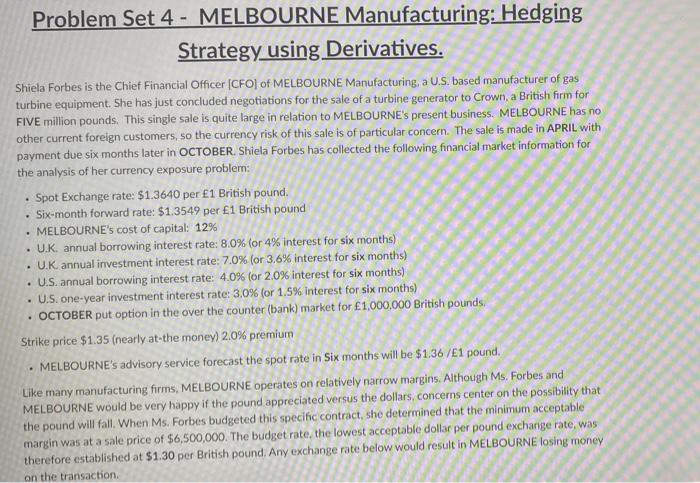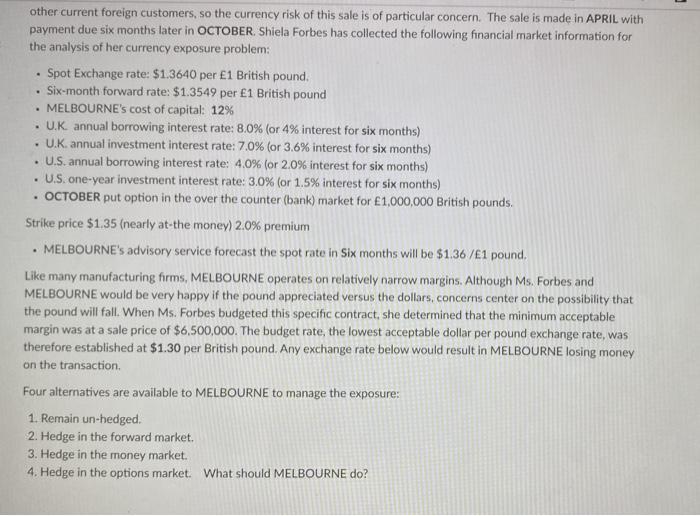Problem Set 4 - MELBOURNE Manufacturing: Hedging Strategy using Derivatives. Shiela Forbes is the Chief Financial Officer (CFO) of MELBOURNE Manufacturing, a U.S. based manufacturer of gas turbine equipment. She has just concluded negotiations for the sale of a turbine generator to Crown, a British firm for FIVE million pounds. This single sale is quite large in relation to MELBOURNE's present business. MELBOURNE has no other current foreign customers, so the currency risk of this sale is of particular concern. The sale is made in APRIL with payment due six months later in OCTOBER. Shiela Forbes has collected the following financial market information for the analysis of her currency exposure problem: Spot Exchange rate: $1.3640 per 1 British pound. Six-month forward rate: $1.3549 per 1 British pound . MELBOURNE's cost of capital: 12% .U.K. annual borrowing interest rate: 8.0% (or 4% interest for six months) . U.K. annual investment interest rate: 7.0% (or 3.6% interest for six months) U.S. annual borrowing interest rate: 4.0% (or 2.0% interest for six months) U.S. one-year investment interest rate: 3.0% (or 1.5% interest for six months) OCTOBER put option in the over the counter (bank) market for 1,000,000 British pounds. Strike price $1.35 (nearly at the money) 2.0% premium MELBOURNE's advisory service forecast the spot rate in Six months will be $1.36/E1 pound. Like many manufacturing firms, MELBOURNE operates on relatively narrow margins. Although Ms. Forbes and MELBOURNE would be very happy if the pound appreciated versus the dollars, concerns center on the possibility that the pound will fall. When Ms. Forbes budgeted this specific contract, she determined that the minimum acceptable margin was at a sale price of $6,500,000. The budget rate, the lowest acceptable dollar per pound exchange rate, was therefore established at $1.30 per British pound. Any exchange rate below would result in MELBOURNE losing money on the transaction . . . other current foreign customers, so the currency risk of this sale is of particular concern. The sale is made in APRIL with payment due six months later in OCTOBER. Shiela Forbes has collected the following financial market information for the analysis of her currency exposure problem: Spot Exchange rate: $1.3640 per 1 British pound. Six-month forward rate: $1.3549 per 1 British pound MELBOURNE's cost of capital: 12% U.K. annual borrowing interest rate: 8.0% (or 4% interest for six months) .U.K. annual investment interest rate: 7.0% (or 3.6% interest for six months) U.S. annual borrowing interest rate: 4.0% (or 2.0% interest for six months) U.S. one-year investment interest rate: 3.0% (or 1.5% interest for six months) OCTOBER put option in the over the counter (bank) market for 1,000,000 British pounds. Strike price $1.35 (nearly at the money) 2.0% premium MELBOURNE's advisory service forecast the spot rate in Six months will be $1.36/1 pound, Like many manufacturing firms, MELBOURNE operates on relatively narrow margins. Although Ms. Forbes and MELBOURNE would be very happy if the pound appreciated versus the dollars, concerns center on the possibility that the pound will fall. When Ms. Forbes budgeted this specific contract, she determined that the minimum acceptable margin was at a sale price of $6,500,000. The budget rate, the lowest acceptable dollar per pound exchange rate was therefore established at $1.30 per British pound. Any exchange rate below would result in MELBOURNE losing money on the transaction. Four alternatives are available to MELBOURNE to manage the exposure: 1. Remain un-bedged. 2. Hedge in the forward market. 3. Hedge in the money market. 4. Hedge in the options market. What should MELBOURNE do








